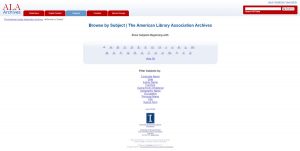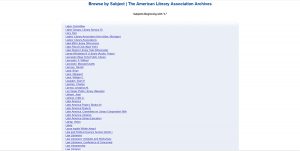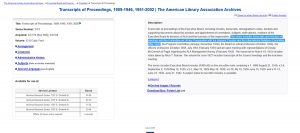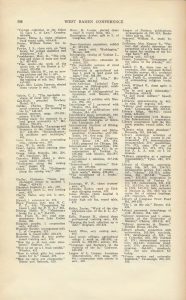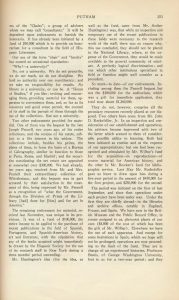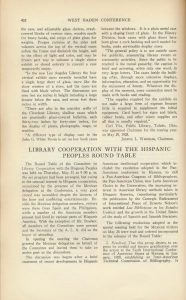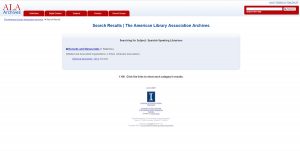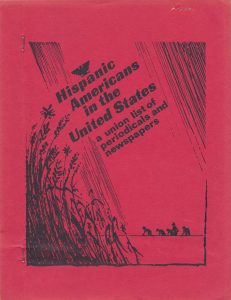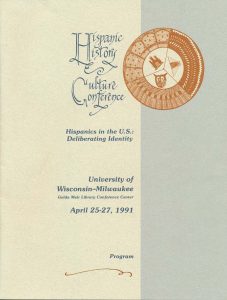From September 15 to October 15, it is Hispanic Heritage Month in the United States and we at the ALA Archives want to help you optimize your research into Hispanic American heritage and history. In this month’s blog post, we’ll take a tour through ALA Archives holdings and we’ll use multiple strategies for finding information.
Read on to learn more about locating Hispanic American history materials at an archives!
Search by Subject
For keyword searches, the ALA Archives database can be searched to find related record series based on subjects. Similar to a library catalog, an archivist personally identified multiple subjects which are evidenced in an archives’ record series. Different from some library catalogs, some archives databases use subject headings primarily based on the archives’ holdings–rather than using a national subject heading system. Also, when using subject searches, careful researchers should be sure to use old subject terms, in case the local archives has not updated all subject keywords yet. Of course, we will use the ALA Archives as an example.
In the images above, we see the first screen of the subject keyword directory and we see that each subject is listed alphabetically. When researching Hispanic American history, one possible subject term is “Hispanic American”. So, we click the letter “H” to view the subject keywords which begin with the letter “H”.
Next, we look for the term “Hispanic American”. Unfortunately, we don’t find anything yet. Then, we try the directory for the letter “L”, and we search for terms like “Latina” or “Latino”. Okay! We have sources related to Latin America; but, we are not quite satisfied yet. Never fear: we have a few more options.
Research tip: Instead of searching for a complete term like “Latinx” or “Latin American”, searching by a stem word like “Latin” will include include multiple similar terms (and misspelled words or variants of words).
Now that we can locate some subject keywords manually, after a little more searching in the directory, we eventually find one useful ALA Archives subject keyword: “Library Cooperation, Hispanic People”. As an example, when we click “Library Cooperation, Hispanic People”, then we find one record series which includes reference to an Executive Board meeting transcription featuring the Committee on Library Cooperation with Hispanic Peoples from May 1928. From there, we can read the read the database record entries for more information.
Before pulling the boxes from our vault, careful researchers will search the ALA Archives reference library, where bound copies of Published Proceedings of annual conferences, general sessions, and membership meetings (Record Series 5/1/1) will include summary information about such an executive board meeting. In the index, we see two items about Hispanic people: “Cooperation with Hispanic Peoples” and “Arrangement with Library of Congress and Hispanic Society”. After reading those pages, we learn that the “Cooperation with Hispanic Peoples” was an international project including coordinating translation and sharing of library sources in Spanish. We also learn that in 1928 there was a $100,000 fund to purchase recent books written in Portuguese and Spanish, as well as Spanish-American history, art, and literature, which would likely by accessed by a group known as the “Hispanic Society” (now the Hispanic Society of America).
Then, we pull ALA Archives boxes from the vault. In Record Series 2/1/1, we investigate what the contents of the May 1928 “Cooperation with Hispanic Peoples” meeting was about. In the box, we find a folder with 63 pages of typed meeting minutes, and you can read it online on our website too!
At this time, after reading the term “Spanish-American”, careful researchers will return to the subject directory to search for terms including the word “Spanish”, and we find one more record series concerning Spanish Speaking Librarians (or their Spanish Speaking communities). That record series bring us to the one publication series of interest to researchers: Reforma.
Reforma Newsletter
Since 1971, Reforma, the National Association of Spanish Speaking Librarians in the United States, has supported professional communication, development, and exchange between librarians, and Reforma Newsletter (Record Series 85/4/40) has been the primary means of communication. Historic annual volumes include at least two issues while later volumes include as many as six issues, featuring reporting on Spanish Speaking librarian and library news across the country. Researchers’ inquires are well-rewarded with select biographies of Spanish-Speaking librarians and histories of Spanish-Speaking librarian initiatives, programs, and the populations who they serve. A recent blog post about our holdings of the Reforma newsletter can be read here.
By the time you reach this section of the blog post, you should be able to locate a subject keyword to find record series which may contain the information that you seek. If that is not working, then this is a great chance to remember to always consult your local expert–the archivist!
Search by Archivist
If you ask me about Hispanic American history at the ALA Archives, then I would answer “let’s think about who wrote that topic and we can start there”. This is because the person (or group) who made (or saved) a document is probably the same person (or group) who donated the document (and we keep donations together as we file documents). Would another example help?
Loida Garcia-Febo is the current A.L.A. President (2018-19), and many A.L.A. offices have documents received from her. After retiring, Ms. Garcia-Febo could donate her presidential papers to A.L.A. Archives as a single Record Series. However, other administrative documents will be kept by the those offices because they still needed those active records. At a later date, other A.L.A. offices would donate their records which include some items written or co-written by Ms. Garcia-Febo.
While, sometimes, we have the personal papers of a person; often, we have the administrative records or publications of an office. So just because we don’t have the personal papers of one librarian does not mean that we don’t have other records of their career or life.
Other Librarians Supporting Hispanic Librarianship and Hispanic American Studies
Sanford Berman
One helpful resource is the Sanford Berman Papers (Record Series 97/1/40). Mr. Berman has been active advocating for concerning improved subject access to library materials as well as archaic and prejudicial Library of Congress subject headings, and these communications are documented in his rich, extensive correspondence which are available to researchers. For example, in this record series, researchers can find a copy of the 1979 Hispanic Americans in the United States: a Union List of Periodicals and Newspapers compiled by Neil E. Strache and James P. Danky.
James Danky
Speaking of Mr. Danky, still another great resource is the James Danky Papers (Record Series 97/1/44). Mr. Danky has been active in advocating for the collection and study of print culture including alternative and small press publications. For Hispanic American history, Mr. Danky’s papers include his research correspondence (1973-82) concerning the compilation of Hispanic Americans in the United States: a Union List of Periodicals and Newspapers, and his conference planning committee correspondence for the 1991 Hispanic History and Culture Conference “Hispanics in the U.S.: Deliberating Identity” at the University of Wisconsin at Milwaukee.
Search by Archivist (Again and Often!)
As the name suggests, researching is searching and re-searching again, which implies that all of the above research strategies could (and should) be enjoyed multiple times for a given research project. Of course, be sure to check-in with your archivist during different stages of your research. Not only will the archivist alert you to new or incoming materials, the archivist has a great amount of experience searching the archives. Your archivist should be an irreplaceable resource for your own archival research.
Thinking like an Archivist
However, if you are not necessarily researching Hispanic American library history, then we have other resources and suggestions too. Your research into the archives is limited only by your imagination (and the hours of the archives).
The first example which comes to mind is our 2016 acquisition of the Dr. Gail Ann Schlachter papers (Record Series 97/1/76). Dr. Schlachter (A.L.A. Executive Board member) researched and published multiple editions of financial aid directories for Hispanic American students. The correspondence regarding research and publication of Financial Aid for Hispanic Americans, as well as the history of the publication or publisher, may also be valuable for research and understanding.
We hope that the many uses and reuses of all materials at the A.L.A. Archives inspires some ideas and we look forward to your visit soon.
